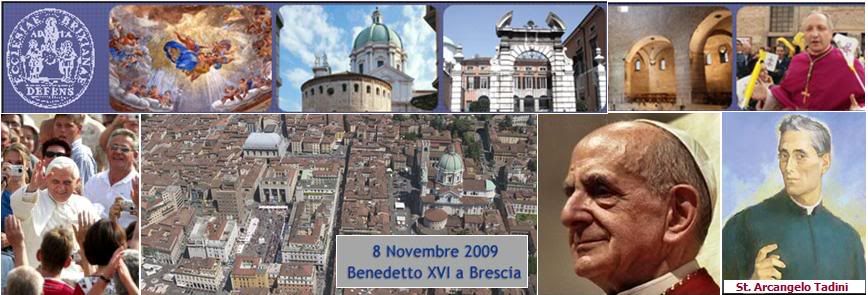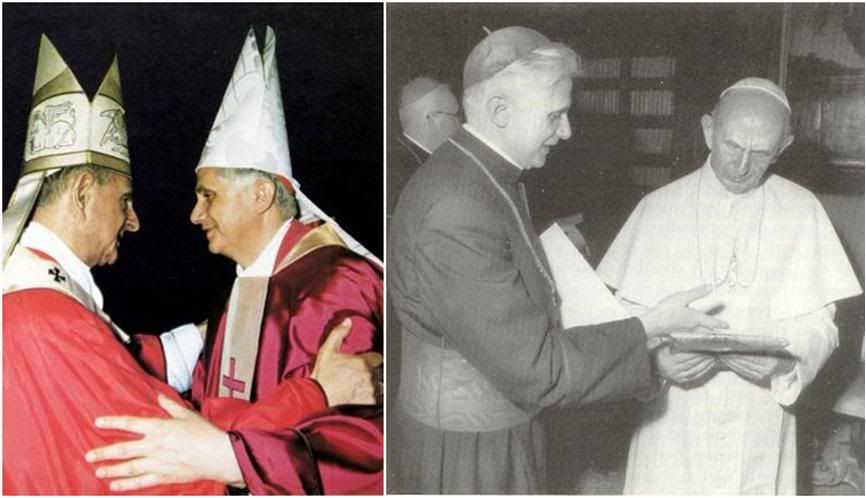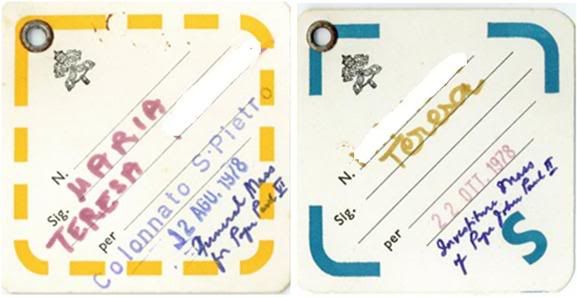

 The ties that bind
The ties that bind
Benedict XVI and Paul VI
by Lucio Brunelli
Translated from

November 6, 2009
The homage that Benedict XVI will render tomorrow to Paul VI in Brescia and Concesio is not just a formal act, nor one of institutional duty.
The ideal bonds that unite these two Popes are numerous, and it is not reckless to say that the consonance between Papa Ratzinger and Papa Montini is even more immediate and profound than those between John Paul II and his prefect for the Doctrine of the Faith.

Benedict XVI was one of the last Montiniani cardinals, receiving the red biretta from Paul VI in the last consistory of his Pontificate in June 1977.
Subsequently, Joseph Ratzinger and the American Cardinal William Baum were the last of the Montiniani cardinals to take part in a Conclave. In future Conclaves, for purely chronological reasons, there will be no more Montini cardinals.
But the ties that link the Bavarian Pope to the Brescian Pope are not simply generational. So many other things do. To begin with, their temperament.
Seriousness and a dry reticence: neither one fond of the limelight, almost timid. Discretion and delicacy: As natural virtues, bred into their DNA. Virtues that are rare and precious in our day, which is marked by coarseness, the obligation to blabber and scream while unable to listen to others, nor to have patience with them.
Ratzinger and Montini - two refined intellectuals who decided to devote themselves to the care of souls. The first, a theologian and university professor, whose reputation reached Rome early. The second, spiritual director to the Italian Catholic university federation, and a lifelong lover of philosophy and the arts. Both of them passionate devotees of the Fathers of the Church, especially St. Augustine.
Both have used their rediscovery of Tradition to approach modernity in a new way. The great challenge: to heal the split between faith and reason, or even, between faith and life.
Neither of them, as young priests, had the pastoral experience of being a simple parish priest.
[Though Joseph Ratzinger spent at least a year after ordination carrying out the full range of pastoral duties in a suburban, partially rural parish.]
Ratzinger almost immediately proceeded to further studies and teaching, while Montini was recruited into the diplomatic service of the Holy See.
And then, as mature Churchmen, both were suddenly and unexpectedly catapulted to lead important dioceses: Munich and Milan, respectively, before ending up Bishop of Rome, the Church born with the blood of the Apostle Martyrs Peter and Paul.
So many human and existential traits in common. A perfect consonance in their historical judgment of Vatican II and the troubled execution of what it decreed.
The young Ratzinger was one of the theologians of renewal. The great Council called by Blessed John XXIII seemed destined to realize all the dreams and expectations of a 'new' Church that was to be, finally, much closer to contemporary men, liberated from useless frills, open to ecumenical dialog, a Church of mercy and witness rather than one of condemnation and naysaying. All ideals shared by the theologian and the onetime university counselor.
But them came the initial disappointments, immediately following the conclusion of Vatican II. In the early 1970s, these already included liturgical abuses, questioning the fundamental truths expressed in the Creed, crisis of vocations, rejection of papal authority...
Paul VI felt that many hopes had been betrayed: "It was thought that after the Council, there would be a time of sunlight for the Church. Instead, there have been clouds, storms and darkness... Through some crack, the smoke of Satan has entered the Temple of God" (June 29, 1972).
Those were the same thoughts that permeated the reflections of Professor Ratzinger in the post-Conciliar years - which had nothing to do with the general anti-Conciliar attitude of the Lefebvrians. Rather, it was in defense of the true Vatican II against the widespread interpretation that presented it as a rupture with
Tradition.
This assonance in judgment and concerns would prompt Paul VI to name Prof. Ratzinger Archbishop of Munich-Freising on March 24, 1977, and a few months later, cardinal, on June 27, 1977.
In his homily at the Consistory Mass, Paul VI made a heartfelt appeal for reconciliation and unity within the Church, even as he used harsh words to condemn both traditionalist defiance and progressivist disorientation.
"To those who, in the name of falsely understood creative freedom, have brought such damage to the Church by their improvisations, banality and triviality - indeed, even with deplorable profanation - we ask them to abide strictly by established norms. If these are not respected, then the essence of Catholic doctrine itself, not to mention ecclesiastical discipline, are at risk".
In presenting the new cardinals of that mini-consistory
[the others were Bernardin Gantin of Benin, the Italians Mario Ciappi (then theologian of the papal household; and Giovanni Benelli (for 10 years, he ran the Secretariat of State for Paul VI, named a month earlier to be Archbishop of Florence, and the leading 'moderate' papabile in the two Conclaves of 1978); and Frantisek Tomasek, Archbishop of Prague, named in pectore the year before], the Pope addressed these words to Cardinal Ratzinger:
"We attest this faithfulness to you, Cardinal Ratzinger, whose elevated theological teaching in prestigious university chairs of your native Germany and in numerous worthy publications, has made it clear how theological research - following the royal way of 'fides quarens intellectum' - cannot and should not be detached from profound, free and creative adherence to the Magisterium which authentically interprets and proclaims the Word of God".
For his part, Benedict XVI has paid homage several times as Pope to his great predecessor: "As our lookback towards the past becomes gradually wider and more informed, the merit of Paul VI appears even greater - I would even say superhuman - in presiding over Vatican II, in leading it to a happy end, and in governing the tumultuous post-Conciliar phase" (August 3, 2008)
It would be very reductive to see the link between Popes Ratzinger and Montini in terms of post-Conciliar Catholic 'regret'.
Brescian Cardinal Giovanni Battista Re said rightly, that "more basically and above everything else, what binds them is the profound humanity of their love for Christ and the Church" - both Popes, though intellectuals, passionate witnesses and defenders of the 'faith of the simple folk'.
Addressing the members of the Istituto Paolo VI at the Vatican in March 2007, Papa Ratzinger said:
"The secret of the pastoral activity which Paul VI carried out with tireless dedication - while making some difficult and unpopular decisions
[particularly Humanae Vitae] - was his love of Christ - a love that vibrates in moving expressions in all of his teachings.
"His sense of being the Universal Pastor was impelled by a missionary urge nourished by s sincere desire for dialog with all of mankind."
Benedict XVI said that Paul VI's prophetic call, which he made so many times, "to renew a world tormented by violence and unease through 'a civilization of love' was born from his total trust in Jesus, Redeemer of man."
A 2003 interview given to 30 GIORNI by Cardinal Ratzinger has often been cited for his personal reminiscences of John Paul I and the cardinal's participation in the two conclaves of 1978, but the first part of the interview has been much less cited, about his personal reminiscences of Paul VI, which I have excerpted here:
'The Lord chooses our poverty'
Cardinal Ratzinger tells of his nomination as Archbishop of Munich and as cardinal by Paul VI in 1977
and the two conclaves of 1978
by Gianni Cardinale

Vol, 9, 2003
 The two photos above exhaust the few photos available online showing Cardinal Ratzinger and Paul VI together.
The two photos above exhaust the few photos available online showing Cardinal Ratzinger and Paul VI together.
...
Your Eminence, on 24 March 1977 Paul VI named you Archbishop of Munich, three months later he created you cardinal…
Two or three days after my episcopal consecration on May 26, I was informed of my nomination as cardinal, which therefore almost coincided with the sacramental ordination. It was a great surprise to me. I still don’t know how to explain it all myself.
I know however that Paul VI was aware of my work as theologian. So much so that
some years earlier, perhaps in 1975, he had invited me to preach the spiritual exercises in the Vatican. But I didn’t feel sure enough of my Italian nor of my French to prepare and risk such a venture, and so I said no. But it was evidence that the Pope knew me.
Maybe Monsignor Karl Rauber, now Nuncio in Belgium, played some part in the story. He was then a close collaborator of the Mons. Giovanni Benelli, then Deputy Secretary of Satte (the
Sostituto). In any case, it’s a fact, they’ve told me, that in picking out one of the three names recommended to him for the appointment to Munich and Frisinga, the Pope personally chose my poor self.
The consistory of 27 June 1977 was small, with only five new cardinals…
Yes, we were a small group, interesting and pleasant. There was Bernardin Gantin, the only one still alive apart from myself.
[Gantin died in 2007.] And then Mario Luigi Ciappi, the theologian of the Pontifical House, Benelli of course, and Frantisek Tomasek who had been chosen in pectore already the year before and who received the purple along with us.
They say it was Benelli, who had been appointed Archbishop of Florence on 3 June, who “chose” the names for that “mini-consistory”…
Could be. I’ve never wanted, and don’t want now to speculate about e these things. I respect Providence; what the instruments of Providence may be doesn’t interest me.
What do you remember of that ceremony?
That at the consigning of the biretta, I had a great advantage over the other new cardinals. None of the others had a large entourage with him. Benelli had worked for a long time in the Curia and was not very well known in Florence, so there weren’t many faithful from that city. Tomasek – there was still the Iron Curtain – couldn’t have followers present. Ciappi was a theologian who had always worked, so to speak, in isolation. Gantin is from Benin and it’s not easy to get from Africa to Rome. Whereas I had a crowd behind me: the hall was almost full of people who had come from Munich and Bavaria....
The applause for me was greater than for the others. You could see Munich was present. And the Pope was visibly pleased to see his choice in some way confirmed.
Were you able to have a personal conversation with the Pope on that occasion?
After the liturgy when the Pope had consigned the ring to us, I was told that he wanted to speak to me in private. I had been for many years a simple professor, very far from the upper reaches of the hierarchy and I didn’t know how to behave, I felt a bit awkward in that context.
I didn’t dare speak to the Pope because I still felt too simple, but he was very good and encouraged me. It was a conversation without specific intentions, he wanted to know me first hand, after maybe Benelli had spoken to him about me.
What do you remember of the last year of the pontificate of Paul VI?
At that time, along with the other bishops of Bavaria, I came to Rome for the ad limina visit. And on that occasion, we had a fine meeting with the Pope. Paul VI began to speak in German, he did it fairly well, but he then decided to pass to Italian in which it was easier to communicate.
He spoke from the heart of his life and of his first visit to our country. He recalled that when he had been in Munich, as a young priest, he was somewhat lost and had found many people who had helped him.
It was a personal conversation, without grand discourses: you could see that his heart was open and he simply wanted to share some moments with some of his brethren in the episcopate. It was a very pleasant encounter.
Did you come to Rome at other times when Paul VI was Pope?
Yes, for his eightieth birthday [26 September 1977]. On October 16, he celebrated a High Mass in St Peter’s. I was impressed on that occasion by the way he quoted the
Divine Comedy where Dante speaks about «that Rome whence Christ is Roman» [Purgatory, XXXII, 102, ed.].
Paul VI was considered a bit of an intellectual who had difficulty being warm with others. At that moment he showed an unexpected warmth for Rome itself. I didn’t know or didn’t remember those words of Dante. They impressed me very much.
With those words Paul VI wanted to express his love for Rome that has become the city of the Lord, the center of his Church.
How did you learn of Papa Montini’s death?
I had gone on holiday in Austria. I was informed on the morning of 6 August that the Holy Father had suddenly taken ill. I called the Vicar General of Munich to tell him to immediately ask the whole diocese to pray for the Pope.
Then I took a little excursion and when I returned they phoned me to say that the Pope's condition had gotten worse and shortly after, they called again to tell me he was dead. So I decided that I’d return to Munich the following morning... After writing a letter to the diocese I left for Rome.
Where you attended the Pope’s funeral...
What struck me was the absolute simplicity of the coffin with the Gospel placed on top. The lack of ostentation, the Pope had decided on it, almost shocked me.
I was also impressed by the funeral Mass celebrated by Cardinal Carlo Confalonieri, who being over eighty, would not take part in the conclave: he gave a very fine sermon. As did Cardinal Pericle Felici during another Mass, who spoke of how during the funeral the pages of the Gospel on the Pope’s coffin had been turned by the wind. I then returned to Munich to celebrate a Mass in suffrage: the cathedral was very crowded. Then I came back to Rome for the conclave.
Where you were a “tyro” cardinal…
I was among the youngest but, because I was a diocesan bishop, I belonged to the order of the presbyters, and hence, in the protocol, I came before many Curia cardinals who belonged to the order of deacons. So I was not among the last placed. I remember that at lunch, precedence was also respected and I found myself between Cardinals Silvio Oddi and Felici, two very Italian cardinals....
The English translation of the full interview may be found on
www.30giorni.it/us/articolo_stampa.asp?id=1503
Forgive me for a personal digression here, but I could have 'feasted my eyes' on Joseph Ratzinger in the glory of his Golden Fifties if I had been more aware on the two occasions he was surely present and which I covered - with the help of powerful binoculars and a TV crew located atop the left wing of the Bernini colonnade overlooking the Sagrato. Herewith, my ID tags for the Funeral of Paul VI and for the Inaugural Mass of John Paul II in 1978 (I whited out my surname). For John Paul's Inaugural Mass, the S indicates I was entitled to be in the VIP section on the Sagrato with the Philippine delegation, but I chose to be with my crew, and the delegation did have a private audience with the new Pope two days later. Still, to have missed Cardinal Ratzinger then....:

[Modificato da TERESA BENEDETTA 07/11/2009 19:06]